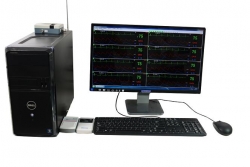Wechat QR code

TEL:400-654-1200

TEL:400-654-1200

With the development of the Internet and new technologies, digital medical applications are frequently applied in recent years. The increasing popularity and application of digital medical technology has made it an effective entry point for changing the status quo in the medical industry. Smartphones, for example, can "pull strings" between healthcare providers and patients, give users access to their own health data, and can help track and personalize healthcare delivery.
For Western citizens, the rate of increase in spending on health care is increasing year by year, as people have come to realize that self-regulation of health is the best way to stay healthy. And for China, digital healthcare can help solve the problem of "seeing a doctor hard." It can be said that with the development of digital medicine, AI, in-depth study, genomics and so on are all included in this field, which in turn makes the application of digital medical treatment more extensively.
Whether it is in the west or in China, the digital medical field is getting more and more attention. For the traditional medical industry and the medical staff who are in it, the digital medical treatment will exert a certain impact on it, but more is to provide assistance , While the size and prospects of the health care market are substantial.

First, the rapid development of digital medical industry, changing the occupational structure of the medical profession
As early as 2015, American cardiologist and professor Eric Topol, Ph.D., made a prediction in the book "The patient will see you: the future of medicine in your hands," in which he thinks the patient will pass by his smartphone The application tests his heart and sends a screenshot of the ECG to the doctor asking his opinion. In other words, people, under the influence of technology, will collect information about their health through the Internet or hardware devices.
For example, a woman in the United States noticed that Jack, her 11-month-old child, had red eyes and yellow eyes. Using a service called Teladoc combined with the information provided by the Health Foundation, she contacted a doctor on a smartphone. The doctor gave a diagnosis of conjunctivitis within minutes, and it took less than half an hour from diagnosis to prescribing.
Examples like this are numerous and fast and efficient. The rise of digital medical treatment is almost inevitable today when the medical industry is in short supply. According to data released by Rock Health, despite the slight decrease in investment in digital medical services over the previous year, VC still maintained its downturn. Last year, the investment in digital healthcare amounted to as much as $ 4.2 billion.
Monitor manufacturer
But for doctors, digital medicine may have a certain impact on their careers. When people are able to detect physical problems through the intelligent hardware around them, the doctor's rate of action is greatly reduced. Although this measure is still in its infancy, it is undoubtedly a threat to the traditional medical industry.
Of course, from another perspective, this can also be a boost to the healthcare industry. While many physicians are not yet accustomed to providing digital medical treatment to patients who come for medical consultations, it is undeniable that digital technologies do provide many ways to break away from traditional barriers for better patient care and Patients provide more diverse options to break the existing medical barriers.
In fact, the application of digital medical treatment is not limited to hospitals. It can be applied in many places and can even be infiltrated into daily life.